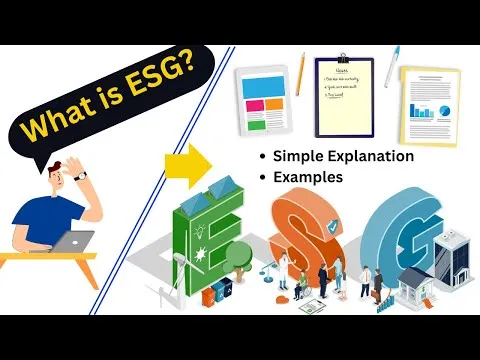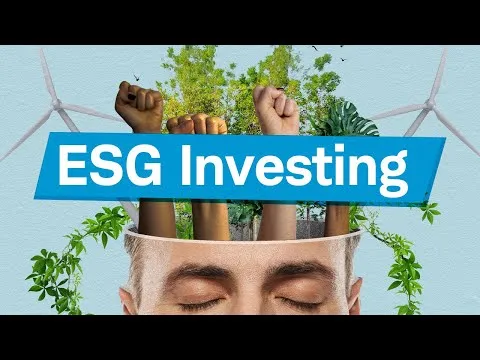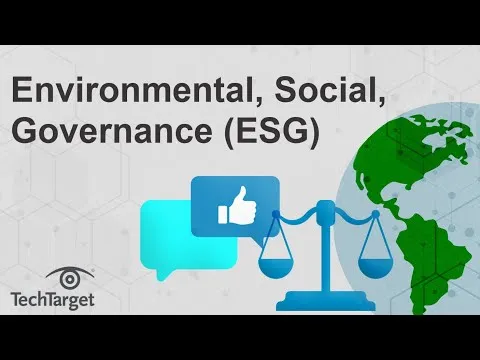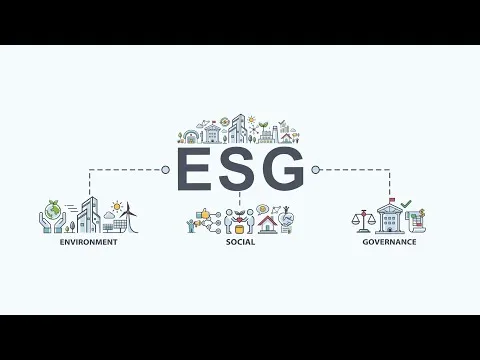
What is ESG? Environmental Social and Governance criteria #esg 
This course on Udemy, 'Basics of Sustainability: Learn in Simple Language', is the perfect way to learn the basics of ESG (Environmental, Social, and Governance) criteria. It covers topics such as Corporate Social Responsibility, Environmental criteria, Social criteria, Governance, and why ESG is important. It also provides insights into the sustainability work of top companies like Google, Microsoft, Tata, JPMorgan Chase & Co., and Goldman Sachs. Additionally, the course provides access to weekly discussions on Sustainability topics, where participants can brainstorm on current issues, understand different perspectives, and share their expertise. Join now to learn the basics of Sustainability and gain access to exclusive perks! ▼
ADVERTISEMENT
Course Feature
![]() Cost:
Cost:
Free
![]() Provider:
Provider:
Youtube
![]() Certificate:
Certificate:
No Information
![]() Language:
Language:
English
Course Overview
❗The content presented here is sourced directly from Youtube platform. For comprehensive course details, including enrollment information, simply click on the 'Go to class' link on our website.
Updated in [September 19th, 2023]
We consider the value of this course from multiple aspects, and finally summarize it for you from three aspects: personal skills, career development, and further study:
(Kindly be aware that our content is optimized by AI tools while also undergoing moderation carefully from our editorial staff.)
What skills and knowledge will you acquire during this course?
During this course on ESG, the learner will acquire various skills and knowledge related to Environmental, Social, and Governance criteria. They will gain an understanding of the importance of considering environmental criteria, such as energy consumption, waste management, resource utilization, and the impact on living beings and climate change. The learner will also explore social criteria, including the relationships and reputation a company fosters with people and institutions in the communities where it operates, as well as labor relations and diversity and inclusion. Additionally, the course will cover governance, which involves the internal system of practices, controls, and procedures that a company adopts to govern itself, make effective decisions, comply with the law, and meet the needs of external stakeholders.
Through the course, the learner will also have the opportunity to participate in weekly discussions on sustainability topics, where they can brainstorm prevalent issues, understand different perspectives from diverse backgrounds, share their own expertise, and learn from others. This master-mind group oriented approach aims to seek solutions and spread positivity.
Furthermore, the course provides examples of top companies' sustainability work and highlights key trends in ESG. The learner will have access to additional resources, such as Google Sustainability Website, Google Environmental Report, Microsoft, Tata, JPMorgan Chase & Co., and Goldman Sachs, which can further enhance their understanding of ESG.
Overall, this course on ESG will equip the learner with the necessary skills and knowledge to comprehend and analyze the environmental, social, and governance aspects of businesses and organizations, enabling them to make informed decisions and contribute to sustainable practices.
How does this course contribute to professional growth?
This course on ESG (Environmental Social and Governance) criteria contributes to professional growth by providing valuable knowledge and insights into the importance of sustainability and responsible business practices. By understanding the ESG framework and its components, individuals can enhance their understanding of how businesses can have a positive impact on the environment, society, and governance.
Through the course, professionals can gain a deeper understanding of corporate social responsibility (CSR) and its significance in today's business landscape. They will learn about the environmental criteria, including energy consumption, waste management, and the impact on living beings and climate change. This knowledge can help professionals make informed decisions and contribute to sustainable practices within their organizations.
Furthermore, the course explores the social criteria, which focuses on the relationships a company has with its stakeholders and the reputation it fosters in the communities it operates in. Professionals will gain insights into labor relations, diversity, and inclusion, which are crucial aspects of responsible business practices. This understanding can help professionals build strong relationships with stakeholders and create a positive social impact through their work.
The course also delves into the governance aspect, which highlights the internal practices, controls, and procedures that companies adopt to govern themselves effectively and meet the needs of external stakeholders. Professionals will learn about the importance of compliance with laws and regulations, as well as making ethical and responsible decisions. This knowledge can enhance their ability to contribute to effective governance within their organizations.
Additionally, the course offers examples of top companies' sustainability efforts, providing professionals with real-world case studies and best practices to learn from. This exposure to successful sustainability initiatives can inspire professionals to implement similar strategies in their own organizations, driving positive change and growth.
Moreover, the course offers opportunities for professionals to engage in discussions and brainstorming sessions with individuals from diverse backgrounds. This collaborative learning environment allows professionals to gain different perspectives and share their own expertise, fostering personal and professional growth.
Overall, this course on ESG criteria contributes to professional growth by equipping individuals with the knowledge and skills to drive sustainability and responsible business practices. It empowers professionals to make informed decisions, build strong relationships, and contribute to effective governance within their organizations, ultimately leading to personal and career advancement.
Is this course suitable for preparing further education?
This course on ESG (Environmental Social and Governance) criteria appears to be suitable for preparing further education. The course covers various aspects of ESG, including environmental criteria, social criteria, and governance. It provides an introduction to the topic, discusses corporate social responsibility, and explores the importance of considering environmental, social, and governance factors in decision-making.
The course also highlights the sustainability work of top companies and discusses key trends in ESG. Additionally, it offers opportunities for participants to engage in discussions and brainstorming sessions on sustainability topics, allowing them to understand different perspectives and learn from others.
Overall, this course seems to provide a comprehensive overview of ESG and its significance in various sectors. It can be a valuable resource for individuals seeking to further their education and understanding in this field.
Course Provider

Provider Youtube's Stats at AZClass
Discussion and Reviews
0.0 (Based on 0 reviews)
Explore Similar Online Courses

Environmental Social and Governance (ESG) at ServiceNow

ESG Investing: Environmental Social and Governance Explained

Python for Informatics: Exploring Information

Social Network Analysis

Introduction to Systematic Review and Meta-Analysis

The Analytics Edge

DCO042 - Python For Informatics

Causal Diagrams: Draw Your Assumptions Before Your Conclusions

Whole genome sequencing of bacterial genomes - tools and applications

What is Environmental Social and Governance (ESG)?

Environmental Social and Governance (ESG) Overview and Framework


Start your review of What is ESG? Environmental Social and Governance criteria #esg